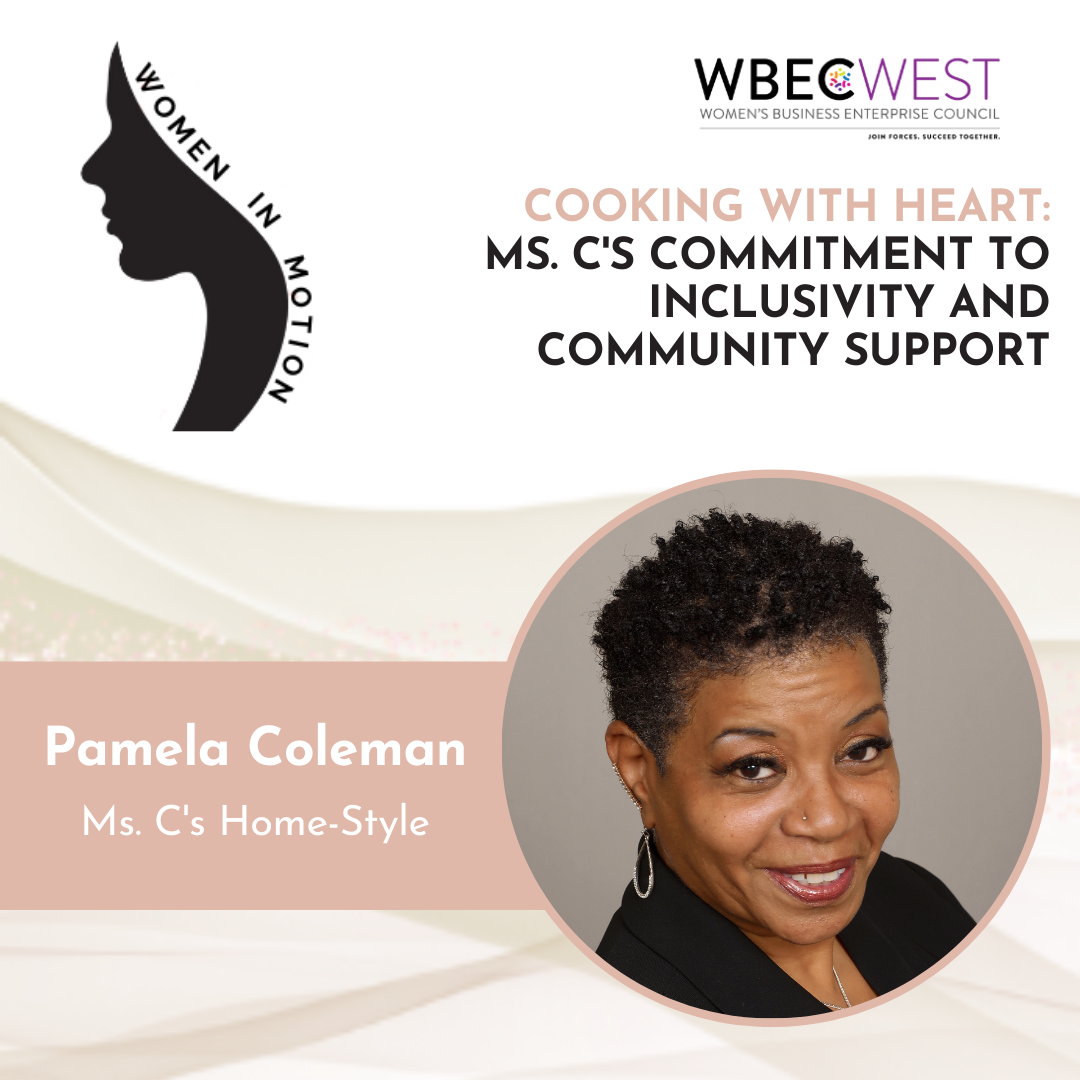
In this episode of Women in Motion, host Lee Kantor interviews Pamela Coleman, owner of Ms. C’s Home-Style, a catering and private chef service in Arizona, Nevada, and California. Pamela shares her culinary journey, emphasizing her business’s evolution during the COVID-19 pandemic and her dedication to using fresh, local ingredients. She discusses adapting to client needs, managing a multi-location business, and the importance of building strong customer relationships. Pamela also highlights her community involvement, challenges in securing funding, and aspirations for expanding into the corporate sector, all while maintaining a focus on inclusivity and exceptional service.

 Pamela Coleman is CEO/Chef of Ms. C’s Home-Style. The services we offer are private chef and catering services for both the private and corporate sectors. Our service areas are the metro areas of Arizona, Nevada and California.
Pamela Coleman is CEO/Chef of Ms. C’s Home-Style. The services we offer are private chef and catering services for both the private and corporate sectors. Our service areas are the metro areas of Arizona, Nevada and California.
We are a National Certified Woman Own Business, WBEC-West, National Certified Food Manager, ServSafe and a Certified ASU Supplier. Through continued education we are in support of sustainable food systems, supporting local farmers and ranchers and using bio degradable packaging and composting.
We are part of the community, working with local non-profits in support of healthy eating and education. We are solid in our commitment to make a difference and impact the lives in the communities that we serve.
Pamela enjoys family, traveling, reading, and living her best life.
Connect with Pamela on LinkedIn and follow Ms. C’s Home-Style on Facebook.
![]() This transcript is machine transcribed by Sonix
This transcript is machine transcribed by Sonix
TRANSCRIPT
Intro: Broadcasting live from the Business RadioX Studios, it’s time for Women In Motion. Brought to you by WBEC-West. Join forces. Succeed together. Now, here’s your host.
Lee Kantor: Lee Kantor here, another episode of Women In Motion and this is going to be a good one. But before we get started, it’s important to recognize our sponsor, WBEC-West. Without them, we couldn’t be sharing these important stories. Today on Women In Motion, we have Ms. C, and she is with Ms. C’s Home-Style. Welcome.
Pamela Coleman: Thank you. Thank you for having me.
Lee Kantor: I am so excited to learn what you’re up to. Tell us about Ms. C’s Home-Style. How are you serving folks?
Pamela Coleman: Well, yes. Ms. C’s Home-Style, the services we provide are private chef services and catering in both the private and corporate sectors. Service areas are the metropolitan areas of Arizona, Nevada, and California. We travel a little bit.
Lee Kantor: So, what’s your backstory? How’d you get involved in this line of work?
Pamela Coleman: You know what? It all began, I guess, it was a hidden gift inside. Of course, I’ve had other businesses along the way, but at some point, just my need to deliver good food to the world came to the front, and I’ve been doing this for several years now, but that is my love language. I want to be able to share, and we know that food is a universal language, so I get to talk to everyone.
Lee Kantor: But how did the business start? Did you just started as a private chef or how did it evolve?
Pamela Coleman: No, actually, I started out in the catering business. A lot of my book of business at that time was in the nonprofit arena. However, COVID hit, so I had to reinvent myself, if you will, because you could no longer gather in large groups, so this is where the private chef and catering came about. So, I cater more on a smaller realm now along with the private chef services.
Lee Kantor: Now, did you notice that people, kind of what they were looking for someone with your skillset, it kind of evolved through the pandemic? Like, there was a big push for meal prepping for a while, is that still a thing?
Pamela Coleman: It is still a thing. And, yes, that’s kind of where it began, because of course, you had that no contact. I wasn’t very busy, obviously, at that time. However, I began to realize how we could help people by being able to have food provided for them. And of course, that evolved once we were able to gather again to be able to go in someone’s home or Airbnb. And it just became something that I felt really comfortable with, so this is where we are now.
Lee Kantor: Now, how do you manage clients in multiple locations like you do?
Pamela Coleman: Well, the locations outside of the Arizona area are few and far between. But even in that situation, though, we’ve done some gigs in Las Vegas, we’ve done some just outside the LA area. So, you know, when that opportunity arises, we see if we can step to the challenge.
Lee Kantor: So, do you physically go with your team there or do you hire people locally in the markets?
Pamela Coleman: No. I take my team with me. We would travel. Depending on the situation, we’ll secure a place to prepare the food, and then of course, continue on with the event.
Lee Kantor: So, any advice for other entrepreneurs out there when it comes to kind of building the relationships that your business needs to be successful?
Pamela Coleman: Well, I guess the advice would be, and that was a big point in growing the business, was forming those business relationships, staying in touch with your client, making sure that you have things taken care of. Something that is important to me is customer care. It is different from customer service, in that I do, I take a personal touch to each and every one of my events.
Lee Kantor: So, you’re trying to kind of elevate the level of service to really make sure that they’re being cared for and they’re getting maybe even more than they asked for?
Pamela Coleman: No, absolutely. I want to make sure that when we do an event, it is a memorable event. We want you to call us back, and we want to make sure, because a lot of events that go on – and you would agree with me too – food is a major factor in the success of that event. So, we just want to make sure that when you call upon us to provide our services that we come with our A-game every time.
Lee Kantor: So, when someone contacts you, what does that initial conversation look like? How do you help them kind of understand all that you can deliver? Because sometimes people don’t know what they don’t know, so they’ll come in here asking for X, but you know that they’d be better served with A, B, C, and D.
Pamela Coleman: No, absolutely. One of the things that I feel kind of separates me from the rest of the crowd is that I do work with the client in a customized menu. I talk to you. I want to find out what you like. Or, you know, if you’re doing a birthday party for your husband, what is his favorite food? So, we want to make sure that the foods that you choose and the ones we prepare are the ones that you enjoy. So, we work with that.
Pamela Coleman: Also, I have a little saying that everybody has a seat at the table in my house because we offer vegan, vegetarian, and gluten-free options. That’s important to us. We want everyone at the table.
Lee Kantor: So, you really kind of scrutinize who’s attending. I want to make sure that they feel welcome, too, and they’re going to get something that they’re going to be happy with.
Pamela Coleman: No, absolutely. And I think part of me comes through in that business. You know, family is important to me. So, these events that I have, they have that vibe to them, they have that feel. That feel of family where everyone gathers.
Lee Kantor: So, when you started this business, was it difficult to get funding?
Pamela Coleman: Absolutely. A majority of the funding came from me and my other businesses in getting the company started. But that has always been a hurdle. I’m at a point now where I’m looking to scale. So, definitely funding is very important. And just as important as a business, you have to prepare yourself financially. Take a look at it and see if you’re ready to make that move to get there, you know, to expand the business and serve even a broader audience.
Lee Kantor: So, right now you’re bootstrapping the business with customer funds or helping you grow kind of organically?
Pamela Coleman: I have. I have grown organically. But like I said, at this point in time, we are ready to take things to the next level, so we’re looking at some other funding options to accomplish our goals.
Lee Kantor: Now, why was it important for you to become part of the WBEC-West community?
Pamela Coleman: Well, it was really important. I’ve known about that organization for a very long time. And I’m in the food industry, and in the beginning I’m going, “Oh, my God,” you know, they’re looking for widgets and gadgets and intellectual property. But I decided to go ahead and become part of that organization, and it has been game changing. It has taught me a lot about building business relationships. It’s given me opportunities to showcase what I do which, of course, has turned into other opportunities. So, it’s been a very, very important piece in the history and the story that I tell of Miss C’s Home-Style.
Lee Kantor: Now, another community that’s important to you is local farmers, how do you work with those organizations?
Pamela Coleman: Definitely. My approach to bringing food to the public, part of that was to mimic what I grew up on. You know, grandma used to send me out in the back to get the tomatoes or onions, or whatever we had growing at the time, and I just wanted to continue with that and bring the freshest possible ingredients that I could to the table. So, as a result, being able to make those connections and those relationships with local farmers and ranchers has been a very important part of Ms. C’s Home-Style.
Lee Kantor: And I think that something that folks who aren’t familiar and haven’t had the opportunity to partake in some local farm fresh ingredients, those are different foods than what you get kind of on the food industrial grocery store. Some of those fruits and vegetables could be sitting in freezers for months, you’re not getting the freshest stuff. But when you’re dealing straight from a local farm, you’re getting it right from the hands of the farmer.
Pamela Coleman: No, absolutely. And it is clear that just as I have a passion for what I do and a love for what I do, the same is in the vegetables that I would get from them. And you’re absolutely right, I’m also a student of sustainable food systems. And when you kind of get an idea of what happens behind the scenes before you see that fruit in the grocery store, it really makes you want to definitely either grow your own or purchase from local farmers.
Lee Kantor: Right. I remember the first time I had a farm fresh egg, and I cracked it open, it was a different food than the egg from the grocery store. It didn’t even look the same. It didn’t taste the same. They were both called eggs, but the fresh one tasted a hundred times better.
Pamela Coleman: There is a clear difference.
Lee Kantor: So, what do you need more of? How can we help you?
Pamela Coleman: Well, of course, as we continue to grow, just the support of the community. And of course, being part of WBEC, because that’s one of the things that we are looking to do as we plan for the coming year, I really want to make a bigger footprint in the corporate arena. So, just continuing to tap into the resources offered by WBEC-West will definitely allow us to do that. So, just let me feed you and it’ll be all right.
Lee Kantor: So, you’re looking for more opportunities in corporate and maybe to cater more of events?
Pamela Coleman: No, absolutely. I mean, in that corporate arena, you’ve got networking meetings, board meetings, department meetings, so there’s always an opportunity to provide a lunch or d’oeuvres at the networking meeting, or things like that. So, the opportunities are there.
Lee Kantor: Yeah. Big or small, food is part of the business world every day. So, if somebody wants to learn more, have a more substantive conversation with you or somebody on your team, what is the website? What is the best way to connect?
Pamela Coleman: Oh, absolutely. Please go to tastemscs.com, and of course, you get an opportunity to kind of see what we do. We’re on Instagram as well under that same handle, and just see what we’re doing in the community. And as a small business, I think it’s important that we work within the community. So, I do a lot of work with nonprofits, working with children and food, and things like that. So, we want to be a company that is impacting and making a difference in the communities that we serve.
Lee Kantor: Is there a story you can share, a memorable event you were involved with?
Pamela Coleman: Oh, absolutely. There’s an organization locally here in Arizona, it’s the Blue Watermelon Project. And we actually go into the schools, we come up with recipes, and the children participate. So, we make sure that they are part of that, and we educate them on the dish or the fruits or the ingredients that are being used. So, it’s a great experience to watch them be interested in cooking and always tell the kids they’re absolutely amazing. And I asked them what they’re going to be when they grow up, and you can only imagine how many chefs are coming your way. It is quite a joy.
Lee Kantor: I’m sure there’s a lot more chefs. The Food Network, people pay attention to that channel. Now, one more time, the website.
Pamela Coleman: The website is tastemscs.com, and that’s the word taste-m-s-c-s-.com.
Lee Kantor: Well, Ms. C, thank you so much for sharing your story today. You’re doing such important work and we appreciate you.
Pamela Coleman: Thank you for having me.
Lee Kantor: All right. This is Lee Kantor, we’ll see you all next time on Women In Motion.














